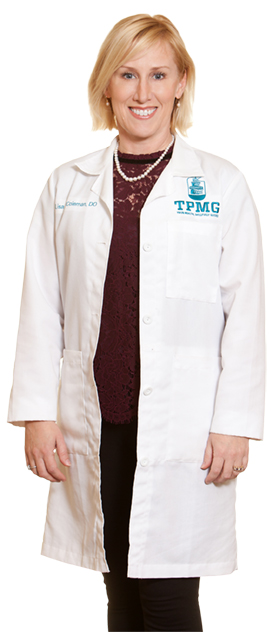Colorectal Surgery, Tidewater Physicians Multispecialty Group, Mary Immaculate Hospital
 One basic hurdle impacts Dr. Lisa Coleman’s work almost daily: too many patients don’t get to her quickly enough, whether they have advanced colon cancer or have struggled for years with benign anorectal conditions such as fecal incontinence.
One basic hurdle impacts Dr. Lisa Coleman’s work almost daily: too many patients don’t get to her quickly enough, whether they have advanced colon cancer or have struggled for years with benign anorectal conditions such as fecal incontinence.
So Coleman’s mission is to alleviate fears, dispel myths and educate local residents and health care providers about colorectal care, while offering the screening tools and advanced medical procedures that can save and change lives.
“There’s so much unnecessary shame and silence surrounding these health issues,” Coleman says. “I find great satisfaction in helping patients to feel comfortable and giving them renewed hope.”
Coleman chose to practice in Hampton Roads because the region is a known trouble spot for colon cancer death rates. According to a 2015 report published by the American Association for Cancer Research, southeastern Virginia ranked among the top three regions of concern – along with parts of the Mississippi Delta and Appalachia – with a rate 9 percent higher than the national average.
Coleman arrived at TPMG about a year ago, after 18 years of service as an Army Lieutenant Colonel who did wartime and humanitarian tours in Afghanistan and Honduras. Most recently, she spent six years as Chief of Colorectal Surgery and Endoscopy at William Beaumont Army Medical Center in Texas, followed by her last duty station at Ft. Belvoir in Northern Virginia.
Since colon cancer is often symptomless until its later stages, Coleman stresses that screening is critical for everyone, regardless of family history. She aims to partner with primary care physicians to recommend routine colonoscopies after age 50. “Early-stage colorectal cancers have a 90 percent cure rate,” she notes. “The screening also is far more tolerable than people think.” For patients who do have cancer or other damaged tissues, new minimally-invasive techniques and robotically-assisted surgeries can better preserve normal function and prevent permanent colostomy bags.
Coleman never shies away from uncomfortable topics. Take fecal incontinence, which often has a devastating impact on quality of life. Yet even as adult diaper sales soar, few patients discuss symptoms and not enough physicians bring up the topic at annual exams.
More common in women, fecal incontinence can arise for a multitude of reasons: old childbirth injuries, age-related muscle degeneration, neurologic conditions, side effects from medication or functional issues or blockages within the rectum and anus. “It requires a detailed evaluation by a specialist to determine the exact etiology and best course of action,” Coleman notes.
Treatment options include medication, surgery, muscle retraining, diet and lifestyle changes and a promising new therapy, sacral nerve stimulation. The latter utilizes an implanted neurostimulator, roughly the size of a cardiac pacemaker, which transmits mild electrical impulses to a lead wire placed near the sacral nerve plexus during a simple outpatient procedure.
“I had one woman come back to me with tears in her eyes, so thankful, telling me it was the first time in 30 years that she hadn’t soiled herself overnight,” Coleman says. “There’s nothing better than having the ability to improve someone’s life like that.”
A Chicago native, Coleman can’t remember a time she didn’t want to be a doctor. By age 16, she had joined a high school EMT service in Connecticut, where her family had moved, and didn’t blink at responding to car accidents and other traumas. She majored in biology at Mount Holyoke College in Massachusetts, with minors in chemistry, German and mathematics, and earned a medical degree at Western University of Health Sciences in California.
Coleman planned on becoming a trauma surgeon until she heard a guest lecture by a world-renowned colorectal surgeon, Dr. Stanley Goldberg, during her General Surgery residency at Tripler Army Medical Center in Hawaii. Goldberg described the rich variety of his work – from removing precancerous polyps during colonoscopies to performing complex abdominal surgeries and anal-rectal reconstructions – and also shared that only 9 percent of specialists were women.
“I remember thinking, ‘I’m sure there are women patients who would be more likely to address their problems with a female physician,” Coleman says. “This specialty had everything I wanted.” She went on to complete a fellowship in Colon and Rectal Surgery at St. Luke’s-Roosevelt Hospital in New York.
While on active duty, Coleman worked as a surgeon and instructor for medical residents at Army hospitals in Louisiana and Texas; in 2009, she deployed to Afghanistan for six months during Operation Enduring Freedom. She served as Chief Surgeon for a team at Forward Operating Base Lagman, earning a Bronze Star Award.
One of the biggest challenges was psychological, she relates: “As doctors, we’re not supposed to treat family members because it’s hard to think clearly with so much emotion involved. Well, these guys became my family. I ate breakfast with them every day and then saw them with these devastating injuries. As a mother – my two kids were very young then – it was painful when they’d say, ‘Tell my mom I love her.’ Since then, I have tried even harder to connect with my patients on a deeper level – to remember how scared they often are, even outside a war or trauma situation.”
In Hampton Roads, Coleman’s ultimate goal is to open a comprehensive multispecialty center for all pelvic floor disorders, many of which are interconnected. In the meantime, she welcomes calls not only from potential new patients but from physicians of all specialties.
“I will answer any question and give any advice I can,” she says. “The more everyone talks – the more that shame and silence stops – the better.”

